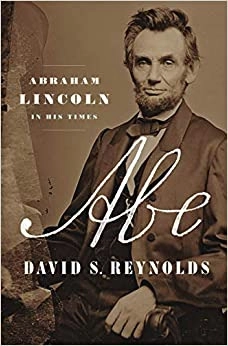Reading Time
20 hrs 49 mins
How long to read Abe: Abraham Lincoln in His Times?
The estimated word count of Abe: Abraham Lincoln in His Times is 312,015 words.
A person reading at the average speed of 250 words/min, will finish the book in 20 hrs 49 mins. At a slower speed of 150 words/min, they will finish it in 34 hrs 41 mins. At a faster speed of 450 words/min, they will finish it in 11 hrs 34 mins.
| Abe: Abraham Lincoln in His Times - 312,015 words | ||
|---|---|---|
| Reading Speed | Time to Read | |
| Slow | 150 words/min | 34 hrs 41 mins |
| Average | 250 words/min | 20 hrs 49 mins |
| Fast | 450 words/min | 11 hrs 34 mins |
- Authors
-
David S. Reynolds
More about Abe: Abraham Lincoln in His Times
312,015 words
Word Count
for Abe: Abraham Lincoln in His Times
1088 pages
Pages
33 hours and 33 minutes
Audiobook length
Description
From one of the great historians of nineteenth-century America, a revelatory and enthralling new biography of Lincoln , many years in the making, that brings him to life within his turbulent ageDavid S. Reynolds, author of the Bancroft Prize-winning cultural biography of Walt Whitman and many other iconic works of nineteenth century American history, understands the currents in which Abraham Lincoln swam as well as anyone alive. His magisterial biography Abe is the product of full-body immersion into the riotous tumult of American life in the decades before the Civil War.It was a country growing up and being pulled apart at the same time, with a democratic popular culture that reflected the country's contradictions. Lincoln's lineage was considered auspicious by Emerson, Whitman, and others who prophesied that a new man from the West would emerge to balance North and South. From New England Puritan stock on his father's side and Virginia Cavalier gentry on his mother's, Lincoln was linked by blood to the central conflict of the age. And an enduring theme of his life, Reynolds shows, was his genius for striking a balance between opposing forces. Lacking formal schooling but with an unquenchable thirst for self-improvement, Lincoln had a talent for wrestling and bawdy jokes that made him popular with his peers, even as his appetite for poetry and prodigious gifts for memorization set him apart from them through his childhood, his years as a lawyer, and his entrance into politics.No one can transcend the limitations of their time, and Lincoln was no exception. But what emerges from Reynolds's masterful reckoning is a man who at each stage in his life managed to arrive at a broader view of things than all but his most enlightened peers. As a politician, he moved too slowly for some and too swiftly for many, but he always pushed toward justice while keeping the whole nation in mind. Abe culminates, of course, in the Civil War, the defining test of Lincoln and his beloved country. Reynolds shows us the extraordinary range of cultural knowledge Lincoln drew from as he shaped a vision of true union, transforming, in Martin Luther King Jr.'s words, "the jangling discords of our nation into a beautiful symphony of brotherhood." Abraham Lincoln did not come out of nowhere. But if he was shaped by his times, he also managed at his life's fateful hour to shape them to an extent few could have foreseen. Ultimately, this is the great drama that astonishes us still, and that Abe brings to fresh and vivid life. The measure of that life will always be part of our American education.
